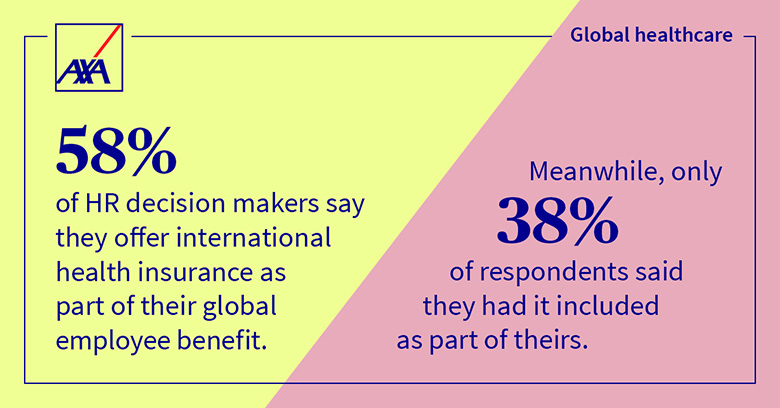Putting a benefit in place to support employees is only part of the story. People need to know that they have the benefit and how to use it before they can feel reassured and supported.

Putting a benefit in place to support employees is only part of the story. People need to know that they have the benefit and how to use it before they can feel reassured and supported.

Our recent research uncovered that 58% of HR decision makers say they offer international healthcare insurance as part of their global employee benefit but only 38% of respondents said they had it included as part of theirs, leaving a big gap to be filled. Could this leap between what benefits employees think they get and what employers actually offer highlight a breakdown in communication when it comes to employee support? There’s really no value in providing a service that no one knows about.
There’s no doubt that it’s important for employers to have an effective communication programme to encourage employees to use the services available to them. While they might not need them every day, they do need to know how to quickly access them whenever they need them – particularly for those employees working overseas in unfamiliar environments. By developing a communication programme to regularly remind employees of their benefits, they’ll be more likely to use them when it matters. And even better, it makes the most of an employers’ investment.
But the numbers also raise another question: If only 38% of assignees report they have international healthcare cover, and 58% of businesses say they offer it, does this perhaps show that IPMI is being offered to only some employees on an assignments? Rebecca Freer, Head of Global Healthcare Marketing at AXA gives us some insight:
“Our research showed that international health insurance is the most valued benefit to both HR professionals and their employees alike. Choosing whether to make this option available is understandably often driven by its affordability. We know the cost of assignments has increased significantly over the past three years. Costs of healthcare delivery around the world vary widely – medical inflation increases and it gets more challenging to offer international healthcare cover as a benefit where there are alternatives available.
But, are the alternatives really good enough? Do they offer the healthcare support and reassurance employees need to perform at their best and make their assignment work? For example – access to prevention and early interventions services like mental health support, or telemedicine? Do they provide enough cover for families who may also be on an assignment, or indeed at home, and anxiety over their care becomes a distraction for the employee? If the employee is travelling for work, can they be assured their work and health won’t be interrupted, because they can access medical care wherever they are – even if it is just for a stomach upset? And can they get support to navigate their way through an unfamiliar healthcare system, to make sure the treatment they are getting is of a high quality and in their language?
Perhaps these decisions are driven by complexity. Over the past decade, more and more local health regulations and trade legislation has been introduced, making it more complicated than ever to procure and maintain an international corporate healthcare benefits package – keeping up to speed with regulatory changes is challenging.”
One thing’s for certain; employee benefits are important not only for the individual success of employees themselves, but for the collective success of businesses.
At AXA – Global Healthcare we offer this support, and more, giving businesses reassurance that their employees have the support and everything they need to access it, so they can perform at their best.
To find out what else we learned, you can read the complete World of Work report.
The information in this article is correct at the time of publishing.